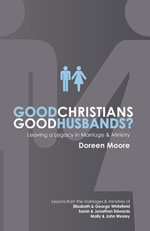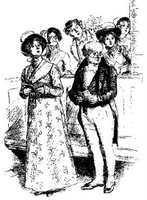Good Christians = Good Husbands? Part 2
The aspect of marriage that I hear most often discussed in Evangelical circles is a man's leadership and a woman's submission to his leadership. And while I strongly affirm this biblical truth, I believe there are other aspects of marriage spoken of in the bible that are largely neglected.
For instance, Malachi 2:14 speaks of a man's wife as his "companion and ... wife by covenant." I have not often heard it said that 'companionship' is a purpose of marriage. I was fascinated as Moore described Jonathan Edwards view of this aspect of the marriage dynamic:
The husband chose his wife to be close to him above all others. They share each other's joys and sorrows. They do all they can to help one another and seek the good and comfort of the other. "They rejoice in each other." Sarah was Jonathan's nearest and most intimate companion. Edwards also said that God commands "so great and dear a friendship to be maintained" (p.117).The necessity of intentionally cultivating this kind of deep friendship in marriage is not something that I've thought a lot about (however, I am very thankful for my husband who has certainly done this.)
I was also interested to hear how
"Edwards clearly taught that married couples should seek to understand each other and meet each other's needs. However, the emphasis is on self-denial for the good and the happiness of the other, not the selfish demands that one's needs be met" (p.119).It certainly takes time and effort to "understand" your spouse, and to be able from that understanding to act in a way that would benefit them. It is a special marriage when each understands the other's insecurities and can effectively encourage them, or when each knows best how to please their spouse and make their quality of life better.
Another aspect of marriage that Moore touches on is the necessity of meeting each other's sexual needs (1 Cor. 7:3-4), and not depriving one another for long (1 Cor. 7:5) (p.142) . (I can't help wondering how John Wesley, George Whitefield, David Livingstone and others who were gone from their families for such extended periods of time could ignore or somehow 'deal' with this verse.) Prov. 5:15-19 speaks of a man being sexually satisfied in his wife alone and that he should 'be intoxicated always in her love." (This seems to go expressly against Whitefield's view that love is a "foolish passion." See my earlier post here.) Jonathan Edwards seemed to enjoy this part of his marriage and commented that"the conjugal relation leads the persons united therein to the most intimate acquaintance and conversation with each other" (p.117).
Of course, she also mentions Ephesians 5:22(p.142). It is mind boggling to think that the sacrificial love, submission, cherishing and oneness that goes on in marriage is reflective of Christ and the church! What a privilege to be able to testify of this relationship in day to day life!
Some of the other responsibilities and purposes she lists are spiritual encouragement (Ecc. 4:9-12), producing godly children (Mal. 2:14), and that wives should obey their husbands and that husbands should live with their wives "in an understanding way" (1 Pet 3:7), which she rightly points out, necessitates that the husband is living with his wife and doing it in and understanding way.
In conclusion, I agree with Moore that marriage does necessitate changes in one's life and ministry. 1 Cor. 7:32-34 makes that clear. I believe that serving your family is a ministry and marriage in itself is testimony of the deep things of God. It probably should be said that the opposite could be true, and that someone could make an idol out of marriage to the neglect of other responsibilities that God has called them to. However, biblical responsibilities in marriage should not be neglected in the name of "ministry."






